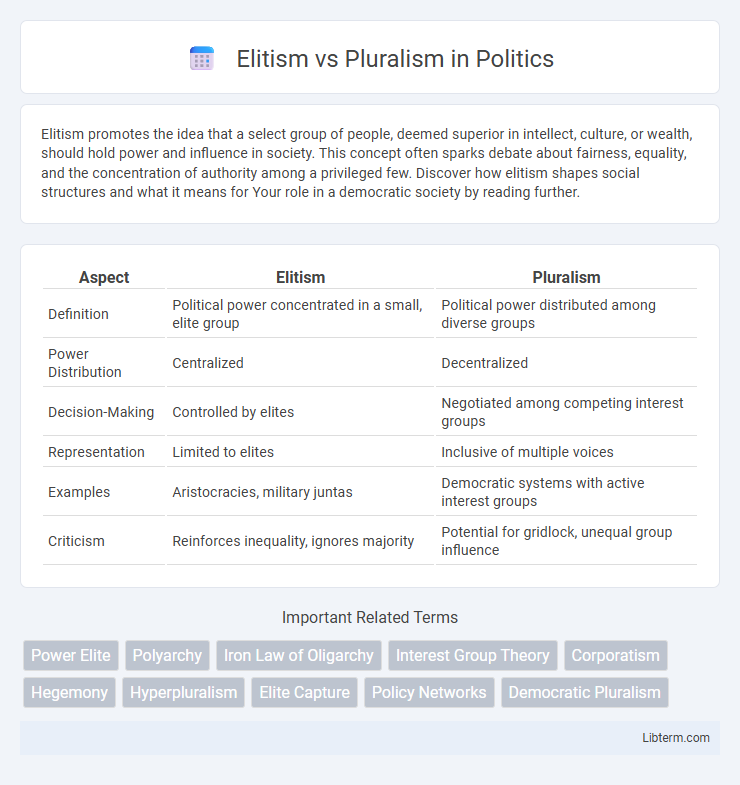Elitism promotes the idea that a select group of people, deemed superior in intellect, culture, or wealth, should hold power and influence in society. This concept often sparks debate about fairness, equality, and the concentration of authority among a privileged few. Discover how elitism shapes social structures and what it means for Your role in a democratic society by reading further.
Table of Comparison
| Aspect | Elitism | Pluralism |
|---|---|---|
| Definition | Political power concentrated in a small, elite group | Political power distributed among diverse groups |
| Power Distribution | Centralized | Decentralized |
| Decision-Making | Controlled by elites | Negotiated among competing interest groups |
| Representation | Limited to elites | Inclusive of multiple voices |
| Examples | Aristocracies, military juntas | Democratic systems with active interest groups |
| Criticism | Reinforces inequality, ignores majority | Potential for gridlock, unequal group influence |
Defining Elitism: Core Principles and Assumptions
Elitism centers on the belief that a small, privileged group holds disproportionate power and influence over political and social decisions, often justified by perceived superior knowledge, skills, or resources. Core principles include the inevitability of hierarchical structures, the limited capacity of the masses to govern effectively, and the necessity of elite leadership for stability and progress. This model assumes that elites act in their own interest, shaping policies that maintain their dominance while marginalizing broader public participation.
Understanding Pluralism: Key Features and Beliefs
Pluralism emphasizes the distribution of power among diverse groups, ensuring that no single entity dominates political decision-making. It advocates for the inclusion of multiple interests and perspectives, fostering a competitive environment where various organizations, such as interest groups and political parties, influence policy outcomes. Pluralist theory asserts that this diversity of participation leads to more balanced and representative governance, reflecting society's complex interests.
Historical Origins: Elitism and Pluralism in Political Theory
Elitism in political theory traces its origins to Classical antiquity, with thinkers like Plato advocating rule by a knowledgeable and virtuous elite, emphasizing hierarchical governance structures. Pluralism emerged prominently in the 20th century, rooted in liberal democratic ideals, highlighting the dispersion of power among diverse interest groups to prevent dominance by a single elite. Both theories evolved as responses to questions about power distribution and legitimacy within complex societies.
Power Distribution: Elites vs Multiple Interest Groups
Elitism posits that power is concentrated in the hands of a small, cohesive group of elites who dominate political decision-making and control key resources. Pluralism argues that power is distributed among multiple competing interest groups, ensuring no single elite holds overwhelming influence and fostering a dynamic balance in policymaking. Research on power distribution highlights the tension between elite dominance and the pluralist ideal of widespread participation across diverse social groups.
Decision-Making Processes: Centralized vs Decentralized
Elitism centers decision-making processes within a centralized authority, where power is concentrated in the hands of a select few individuals or groups, often leading to streamlined but less inclusive governance. In contrast, pluralism advocates for decentralized decision-making, distributing authority across multiple competing interest groups to ensure diverse representation and broader participation in political and social outcomes. The tension between centralized elitist control and decentralized pluralist influence shapes policy development, affecting transparency, accountability, and responsiveness in governance systems.
Social Inequality: Elitism’s Impact vs Pluralism’s Promises
Elitism intensifies social inequality by concentrating power and resources within a small, privileged group, limiting access and opportunities for the broader population. Pluralism promises a more equitable distribution of influence, advocating for diverse groups to share power and enhance social mobility. Despite pluralism's idealistic commitment to inclusivity, persistent structural barriers often challenge its effectiveness in reducing entrenched social disparities.
Representation and Participation in Governance
Elitism posits that a small, privileged group holds the majority of power and decision-making authority in governance, often limiting broader public participation. In contrast, pluralism emphasizes diverse representation, where multiple interest groups compete and collaborate to influence policy, ensuring wider citizen involvement. Representation in elitism is concentrated and hierarchical, whereas pluralism fosters diffuse and participatory governance.
Critiques and Limitations of Elitism
Elitism faces critiques for concentrating power within a small, often unrepresentative group, leading to exclusion of diverse voices and perpetuating social inequalities. Its limitations include the underestimation of grassroots movements and the dynamic influence of multiple interest groups in decision-making processes. Critics argue elitism neglects the complexity and pluralistic nature of modern democracies, where power is more dispersed and contested.
Challenges and Shortcomings of Pluralism
Pluralism faces challenges such as unequal power distribution where dominant interest groups overshadow marginalized voices, undermining democratic fairness. The complexity of accommodating diverse groups often leads to policy gridlock and slowed decision-making processes. Furthermore, pluralism may inadvertently legitimize status quo inequalities by treating all interest groups as equally influential despite systemic disparities.
Modern Implications: Elitism and Pluralism in Contemporary Politics
Elitism in contemporary politics emphasizes the influence of a small, powerful group controlling key decisions, often leading to concerns about wealth concentration and limited public participation. Pluralism advocates for a diverse array of interest groups competing to shape policy, promoting a more participatory and decentralized political process. Modern political dynamics reveal tensions between elitist control by corporate elites and pluralist calls for inclusive representation across socioeconomic and cultural groups.
Elitism Infographic

 libterm.com
libterm.com